Turning the Tables: An Interview with Stu Kennedy
Charles Stuart Kennedy, 2014 winner of AFSA’s Lifetime Contributions to American Diplomacy Award, talks about his Foreign Service career and pioneering work creating American diplomacy’s oral history program.
BY SHAWN DORMAN
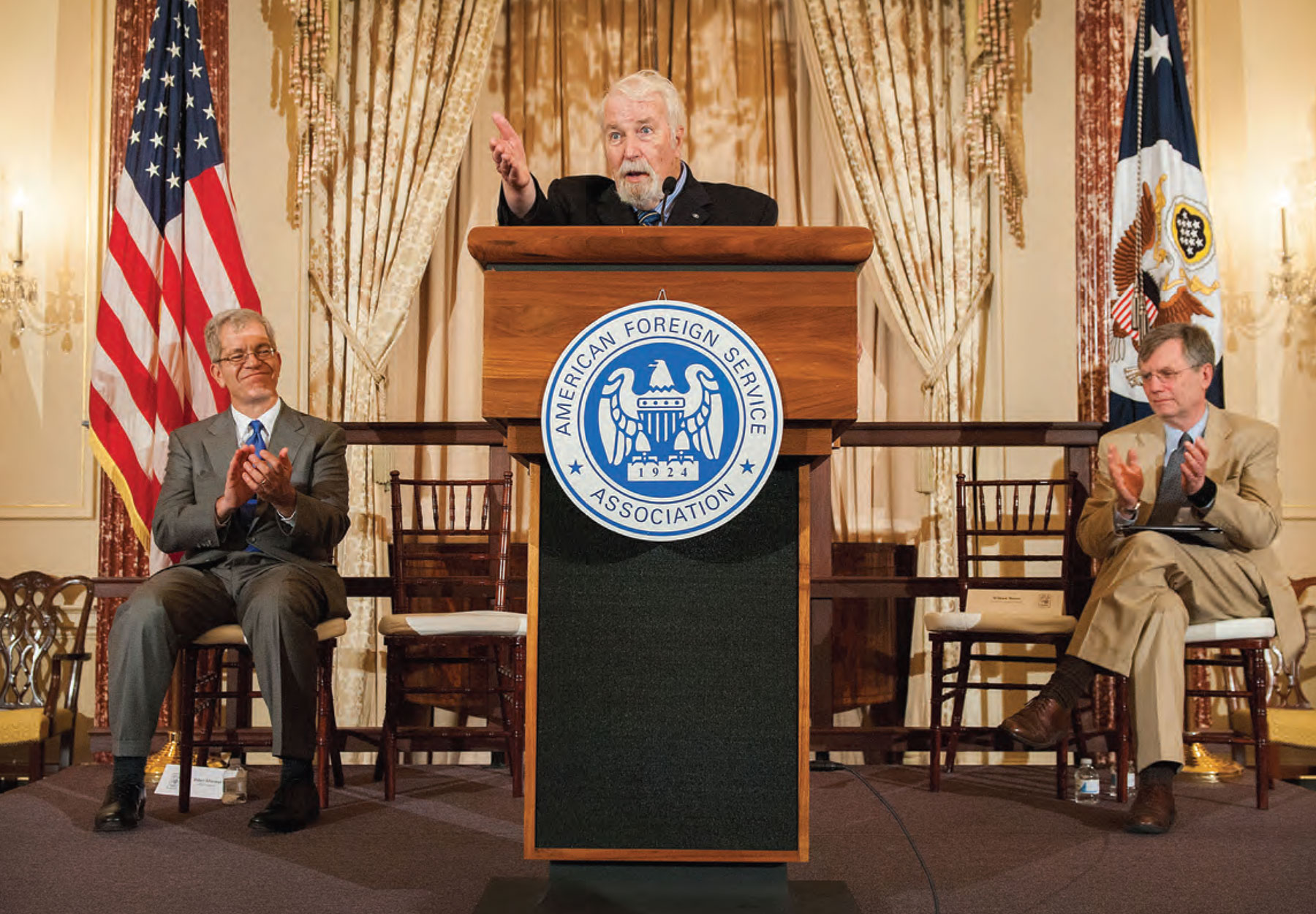
Charles Stuart Kennedy delivers remarks on receiving AFSA’s 2014 Award for Lifetime Contributions to American Diplomacy in the State Department’s Benjamin Franklin Diplomatic Reception Room on June 18. AFSA President Robert J. Silverman, left, and Under Secretary of State for Management Patrick Kennedy, right, applaud.
U.S. Department of State
On June 18, at this year’s awards ceremony, AFSA conferred its Lifetime Contributions to American Diplomacy Award on Charles Stuart Kennedy, in recognition of his distinguished Foreign Service career and lifetime of public service.
The previous recipients of this prestigious award are U. Alexis Johnson, Frank Carlucci, George H.W. Bush, Lawrence Eagleburger, Cyrus Vance, David Newsom, Lee Hamilton, Thomas Pickering, George Shultz, Richard Parker, Richard Lugar, Morton Abramowitz, Joan Clark, Tom Boyatt, Sam Nunn, Bruce Laingen, Rozanne Ridgway, William Lacy Swing and George Landau.
A career officer in the U.S. Foreign Service from 1955 to 1985, Charles Stuart “Stu” Kennedy retired after a distinguished consular career with the rank of minister counselor. Mr. Kennedy was consul general in Naples, Seoul, Athens and Saigon, and also served in Frankfurt, Dhahran, Belgrade and Washington, D.C. Throughout his career, he set a high standard for creatively managing and responding to the growing need for protection of, and services for, American citizens, and for managing U.S. visa programs and processes.
In 1986, after retiring from the Foreign Service, Mr. Kennedy became managing director of The George Washington University’s Foreign Service History Center. There he created the Foreign Affairs Oral History Collection and began recording the insights and experiences of American diplomats. The program moved to Georgetown University and then, in 1988, to the Association of Diplomatic Studies and Training, where he serves as its director.
In that capacity, Mr. Kennedy has personally interviewed more than 1,000 retired American diplomats, some of whose careers date back to the 1920s. The ADST Oral History Collection now includes more than 2,000 entries, which are posted on the Library of Congress website, as well as at ADST’s website. The collection is a rich and essential resource for authors, scholars and journalists.
Mr. Kennedy is the author of The American Consul: A History of the United States Consular Service, 1776-1914 (Praeger, 1990). He is the co-author, with William D. Morgan, of The U.S. Consul at Work (Praeger, 1991) and American Diplomats: The Foreign Service at Work (iUniverse, 2004); and, with Dayton Mak, of American Ambassadors in a Troubled World (Praeger, 1992). He has received the Foreign Service Cup, the Cyrus R. Vance Award for Advancing Knowledge of American Diplomacy, the Forrest C. Pogue Award from the Mid-Atlantic Region Oral History Association and a special citation from the American Academy of Diplomacy.
Early in his Foreign Service career, Stu Kennedy realized that there was no real record of the work of U.S. diplomats. As a result, their fellow Americans have no idea of these individuals’ many contributions and sacrifices, and suffer from serious misconceptions about what Foreign Service members do.
In creating the ADST Oral History Program, he has made an enormous contribution to public understanding of American diplomatic history and the crucial role the Foreign Service has played in advancing U.S. interests around the world.
On June 20, Foreign Service Journal Editor Shawn Dorman sat down with Stu Kennedy to talk about his life and career.
Shawn Dorman: Congratulations on winning AFSA’s 2014 Lifetime Contributions to American Diplomacy Award. Everyone was thrilled by the choice.
Stu Kennedy: Obviously, I’m delighted and honored, and a little bit overawed. I am very thankful to AFSA for doing this. By the way, since this is effectively an oral history, I should note that today is June 20, 2014.
SD: Right! When I went up to Toronto this past spring for the International Studies Association Convention to represent AFSA and the Association for Diplomatic Studies and Training, seeing the reactions from academics to the oral history collection made me even more aware of just how valuable the oral histories are. They really are a treasure trove of primary-source material—firsthand accounts of diplomatic practice.
SK: Yes, it’s like fishing in a barrel. I mean, you take any person involved in foreign affairs and get them to talk about what they’ve done, and they’ve all had remarkable experiences.
SD: As you say to everyone you interview, let’s start at the beginning. Tell me where you were born and grew up.
SK: All right. I was born in Chicago in 1928, just before the Great Depression. That had a profound effect on my family, as it did on so many others. My mother and father separated when I was about 3. I moved to California and ended up in the Pasadena area until about 1939. Then we moved to Annapolis, Md., where my older brother was a midshipman who graduated in the class of 1940.
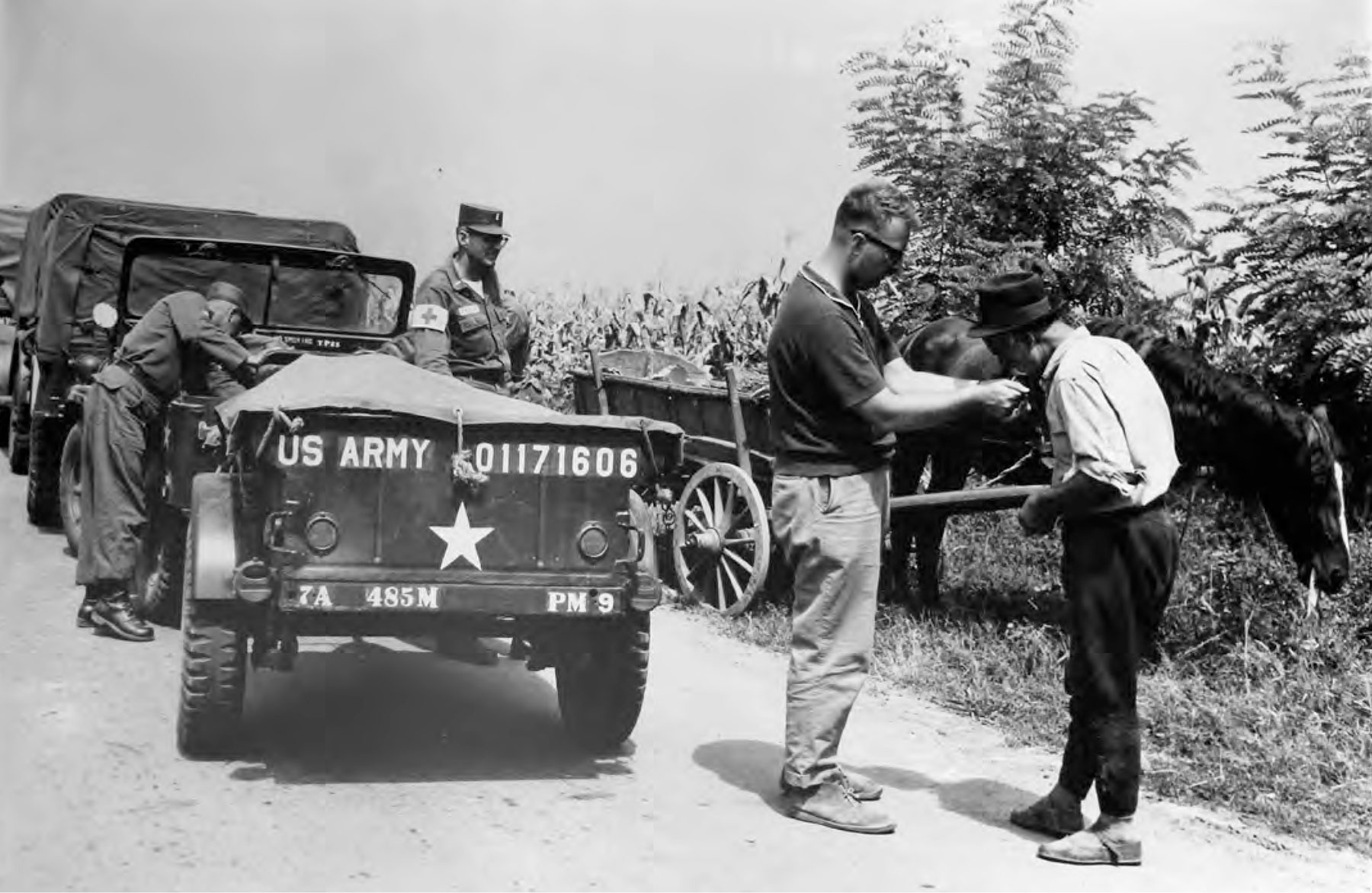
Charles Stuart Kennedy (second from right), U.S. consul in Yugoslavia, at a rest stop with the 7th Army MASH hospital on its way back from treating victims of the 1964 earthquake in Skopje. The hospital was at Kumanovo, now in Macedonia. Kennedy was an adviser to the hospital during this first entry of NATO troops into a communist country on a humanitarian mission.
Courtesy Charles Stuart Kennedy
SD: Where did you get your undergraduate degree?
SK: Williams College. I graduated in 1950. A couple of years later, I joined the intelligence branch of the U.S. Air Force and studied Russian at the Defense Language Institute in Monterey, Calif. It was very good for me because I had gone to one of these nice New England prep schools, a nice New England college, and it was time to get out and meet some other people. Although I was in the intelligence branch of the Air Force, as an enlisted man, I developed an appreciation for non-commissioned officers of the Air Force and how good they are.
Then I was sent to Korea during the Korean War, and I had a very interesting assignment with the U.S. Air Force. One of the lesser known wars that we fought was the U.S. Air Force fighting the Soviet Air Force over North Korea. There were regular combat planes on both sides shooting at each other. Of course, I was one of those who sat on the ground and had a tape recorder listening to this. It was a rather nasty little war.
SD: You were listening to the Russians?
SK: I listened to the Russians directing their fighter pilots to our fighter pilots. And I would pass on to our fighter pilots what the Russians were planning to do. There were a number of us doing this. I’m sure the Soviets were doing the same thing. It’s quite a bit fancier now, but the same thing still goes on.
SD: Same concept, different technology. And what was next after the military?
SK: I served in Japan and Germany for a year each and left the Air Force in 1954 with the rank of airman first class. I used my GI Bill benefits to attend Boston University, where I got a master’s degree in history and a bride. While in the Air Force, stationed near Frankfurt, I had taken the Foreign Service written exam in 1953 and just barely passed.
SD: What was your first post?
SK: Frankfurt. I’m told that approximately a third of the Foreign Service was assigned to posts in Germany for their first tour at that time. We had lots of consulates. I went to Frankfurt and spent one year there, initially with the refugee relief program. We dealt with refugees who during World War II had headed west to escape the Soviets and settled in Germany. Most of them didn’t want to be there, so we arranged for thousands of them to come to the United States. The Canadians and Australians did the same thing.
SD: And when you entered the Foreign Service, did you come in as a consular officer?
SK: There were no cones then. After a while, your assignments showed what you wanted to do, and I found that I really liked consular work. It seemed to me that my friends who were doing political reporting were writing papers for class again. Initially, when a friend would tell me, “My paper went all the way up to the deputy assistant secretary,” I thought, “Wow, ain’t that wonderful?” I preferred to deal more with people, which I enjoyed.
There were no cones then. After a while, your assignments showed what you wanted to do, and I found that I really liked consular work.
SD: Did you feel there was a hierarchy or any snobbism between political and consular officers? Did you see any of that?
SK: Yes. I accepted it at the time; but looking back on it now, I’m sort of horrified. There were two terms that were used: substantive work and non-substantive work. Work in both consular and administrative affairs was considered non-substantive. In today’s world, on the 90th anniversary of the Rogers Act, talk about being politically incorrect! According to that view, getting an American out of jail lacks substance. Incredible!
There are deep roots to this, of course. Years ago, I did quite a bit of research on the history of the consular service and later published a book about it, The American Consul: A History of the United States Consular Service, 1776-1914. For a long time, we had a diplomatic service and a consular service. The diplomatic service tended to be for those who were wealthy—you’d send your son to serve under a certain ambassador to give him a little polish and work on a language and come back. It wasn’t really professional.
The consular service was made up of people who had political clout, from all parts of society, and some of them stayed. It was much involved in trade matters and taking care of seamen. The world was different then, and there was a certain amount of snobbery.
Fortunately, I had gone to what were considered the “right” schools. I didn’t have money, but I had the education. Yet I still recall hearing colleagues say: “This is Stu Kennedy. He may be a consular officer, but he’s one of us.” Happily, I think that attitude is long gone.
As a matter of fact, I think consular work has become far more attractive; not that it’s changed that much, but the perception has. People now see it as getting involved in things and getting things done. I came in just at the beginning of the real involvement in postwar efforts in Europe. After the war, we really were the top dogs in everything concerning foreign affairs. The Foreign Service had not been really fully engaged in World War II. The military had taken over. And by the early 1950s, the military was letting go of its occupation of Germany and of Japan. And the Foreign Service was moving in to establish normal relations, and things were changing.
SD: I wonder if you see any parallels with what happened, say, with the Iraq War and the military having more prominence in foreign policy.
SK: In dealing with war, the military has to take over. But now, I think it’s much more built-in, with Foreign Service political advisers helping the military avoid some mistakes. The civilian side is involved but not in charge until the actual war is over, and then the military in effect says, “Now it’s your baby.” In my era, almost all of us in the Foreign Service were male and almost all of us had served in the military, albeit some of us, like myself, had a very lowly rank; but you had learned to appreciate and understand what the military could and couldn’t do. Back then the military was not necessarily “them;” the military was “us.” And it’s quite a difference from today, I think.
SD: Which of your postings stand out the most in your memory? What was your favorite posting?
SK: My favorite post was Belgrade. I extended there, and was chief of the consular section from 1962 to 1967. I took Serbian with Larry Eagleburger before we went out there. We loved to travel through all the different parts of Yugoslavia. Looking back on it, you could see that the Serbs and Croats didn’t get along, but it didn’t seem nasty. We certainly never imagined that the country would come apart.
Another assignment I wouldn’t say I enjoyed, but was memorable, was the 18 months I spent as consul general in Saigon (1967-1968). I traveled rather extensively. The war wasn’t going well, but those of us in Saigon didn’t feel under any particular threat. I lived out in the middle of Saigon. The Civil Operations and Revolutionary Development Support program was going on then. There were some rockets and some fighting on the outskirts of Saigon. It was quite a different war.
I’ve been interviewing people for more than 30 years. I have a fairly low threshold for boredom, and I’m not bored yet.
SD: Were you married then?
SK: Yes, but my wife wasn’t with me in Vietnam. I’d met Ellen while studying at Boston University, and we got married before I joined the Foreign Service. We just celebrated our 59th anniversary, by the way.
SD: Congratulations, that is an accomplishment!
SK: Next, I served in Greece, an interesting place. I was there from 1970 to 1974, while the military junta was in charge. So, I got to see how inefficient a dictatorship was. That’s one of the nice things about the Foreign Service: you get to observe different types of government. I served in every geographic bureau except Africa and Latin America, and always did consular work while overseas. I served in Frankfurt, Dhahran, Belgrade, Saigon, Seoul, Naples and Washington.
SD: Did you spend much time back in Washington?
SK: Yes, usually in personnel. But many of us stayed overseas as much as possible, because we got better pay there. You didn’t get any particular credit for serving in Washington. I didn’t understand until I got to this oral history program that you could pick work that would be more likely to lead to becoming an ambassador and other plum assignments by working in desk or staff jobs in the State Department.
When I entered the Foreign Service, we were the first post-McCarthy class and got a certain amount of attention for that. I remember one time someone came to the department and asked us, “How many of you want to be ambassadors?” We all raised our hands, of course; but I only raised mine about halfway up because I thought, “Consul general in Bermuda sounds like a hell of a lot more fun!”
SD: It seems there are different types in the Foreign Service, including some who focus on networking and climbing to be ambassadors and others who are more focused on having the experience of a good career and doing what they’re interested in.
SK: Absolutely.
SD: You were consul general four times. What were the most satisfying and the most challenging things about being in that position?
SK: Consular work is one side of the operation of the embassy. When you’re running a consular section, you’re pretty much on your own. You don’t have to write long papers with explanations. You get involved with things dealing with relations with the host country and you’re on the country team, but the basic work was done without somebody on top of you.
The ambassador and deputy chief of mission didn’t give us any trouble. That’s the way it should be. I remember that if you had a difficult case, and you really didn’t want to do anything—figuring that if you hold off a while, something will happen to resolve it— you just sent it off to Washington, because you’d hardly ever get an answer.
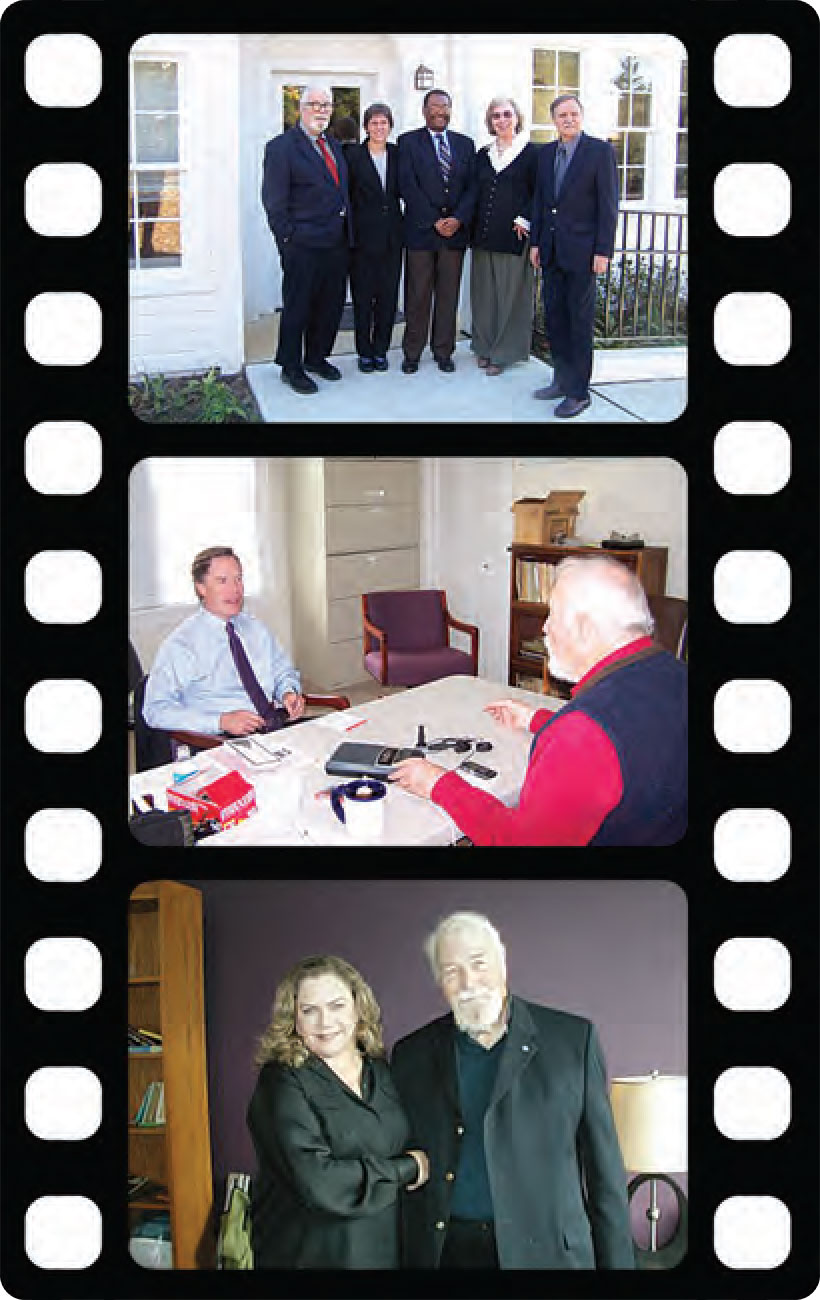
(First) Stu Kennedy, left, with the ADST team in 2007: Financial Officer Marilyn Bentley, Executive Director Les McBee, Publishing Director Margery B. Thompson and President Amb. Kenneth L. Brown. (Second) Stu Kennedy interviewing Amb. Nicholas Burns, a career FSO and former under secretary of State for political affairs (2005-2008). (Third) Foreign Service “brat” Kathleen Turner, an interviewee, with Kennedy.
ADST / AFSA / Jeff Lau
SD: Was there a lot less bureaucracy back then?
SK: Yes. Things have not improved in that regard. I think communications are probably much better now, but there are many more restrictions.
SD: Naples was your last post. You retired in 1985, and then almost right away got to work on the oral history project?
SK: Yes. I had started thinking, “What am I going to do with my life after I leave the Foreign Service?” A lot of retired FSOs were going into declassification work, but that didn’t seem like much fun.
I had attended the funeral of Charles Burke Elbrick, who had been consul in Poland during World War II and was later kidnapped in Brazil. There were so many stories. And I remember at the funeral I saw Larry Eagleburger and many other friends, all of whom had stories of their own to tell. And then it came to me: Someone needs to collect those stories, because no one else knows them.
Back then, you could get a good portable tape recorder for about $35. At first, I had the rather naïve idea that I would just go around and invite people to “tell me about the good old days.” And I’d collect all these stories that would all be there for people to listen to. But when I eventually started the oral history program, I discovered very quickly that a lot more was involved.
First, you had to get everything transcribed. Nobody’s going to listen to people sit and talk. You’ve got to have a repository for them. Then you have to get it out and get it known. So I hustled and got somebody at The George Washington University interested. They took me in with another colleague, Victor Wolf, and that’s where we started the oral history collection.
Unfortunately, Victor was killed in a car accident shortly after we started. One problem was that George Washington University had just one diplomatic historian, and his period was the Napoleonic era, which didn’t dovetail too well with the 20th-century focus of American oral histories.
SD: Then you moved the collection to Georgetown University, right?
SK: Yes, and it stayed there until 1988. Now we’re part of the Association for Diplomatic Studies and Training, at the Foreign Service Institute. They came up with the idea of a whole list of things to do to help the Foreign Service Institute at the time it was getting ready to move to a new campus.
When I started this thing, I had the idea that one of these days, there’s going to be a great library in the sky for material like this, where anyone could use it. I had no idea about the specifics, but the Internet was just starting to take off. In many ways, we’ve really been the beneficiaries of larger developments like that.
SD: Still, you had a lot of foresight before the technology was even there—a vision.
SK: Yes, there was a vision there. Early on, I had some concepts like offering country readers, which would extract from all the oral histories entries that deal with, say, Patagonia or whatever. And I put together about 20 of those. There was no money, so I typed the manuscripts myself and even bound them.
SD: Of course, now the transcripts are online, and searchable, taking it to a new level.
SK: Oh, yes. We’re now past the 2,000 mark. And since we started the intern program, we have been able to do more country readers and even subject readers.
SD: Did you conduct most of the interviews yourself? How long do they take?
SK: Many, but not most of them. Now though, I am doing most of them. In the early days, each oral history would last about an hour and a half. Now they are much longer. I started to put more emphasis on people’s early years. Not all of that information is being used now, but we have a significant body of information about, for example, growing up as an immigrant in the United States, about college protests during Vietnam, things like that.
I should also note that from the very beginning, I wanted each interview to cover social history and be as representative as possible of different demographics. We wanted to interview women, but they just weren’t there. Now they are.
And then it came to me: Someone needs to collect those stories, because no one else knows them.
SD: Were there any interviews that didn’t work?
SK: I remember one: the individual had had a very distinguished career, but when I got there, I realized the poor man had severe dementia. At a certain point, I just turned the tape recorder off and kept chatting.
We do have a problem, a serious one. This is when someone does an oral history interview with us and then does not edit the transcript and return it to us. We have two options. Option one is to turn it over to a volunteer Foreign Service person to clean it up. The other one is to wait until they die. That’s pretty much it. We’re not going to let go of it; it’s just a matter of timing. [Wry laughter, as Kennedy knows that Dorman is one of these slackers.] How is your health?
SD: I’m holding on! It’s fascinating to me, the process and what happens in the interview, the way that you elicit all that personal information. In my interview, it felt like my whole life was laid out before me. Do you feel that you bring out a lot from people that they may not have thought about or may not have considered whether they’re comfortable saying?
SK: This thing does surprise people. I try now to warn them, but this is my natural curiosity. I feel it fits right into this. When you’re looking at somebody who says, “OK, then I decided to declare war on Patagonia,” you want to know where they came from. But on all sorts of things, you really should know who the person is.
We also find out a lot of interesting things about what it’s like to operate in a bureaucracy like the State Department. How did FSOs get along with colleagues at Treasury, the White House or between the bureaus? I’m all for getting as much as we can. It can be rather personal.
Once I interviewed a woman who had immigrated to America from another country. I knew her socially, and she said to me at the end of her oral history: “I thought you were going to ask me about my affairs.” And sometimes people say, “You know, I hadn’t thought about that son of a bitch for 30 years.” You don’t get a lot of backstabbing, though. Maybe it’s the kind of people we’re interviewing. Some are still bitter about their relationship with somebody, often a supervisor. Fair enough, I’ve got no particular problem with that; but for the most part, people tend to be pretty objective.
It’s always a collaborative effort and depends on the type of relationship you set up. And I do quite a few of my oral histories these days over the telephone. I find it works much better than I thought it would.
SD: I know you interview political appointees, as well as career diplomats. Do you see differences between them?
SK: Not really. I try to get as much as I can out of anyone I’m interviewing. So if the person is a politician, I ask about that. For example, I interviewed Robert Strauss and got a lot about Texas Democratic politics from him. Why not? I’ve got these people here, and I’m the vacuum cleaner.
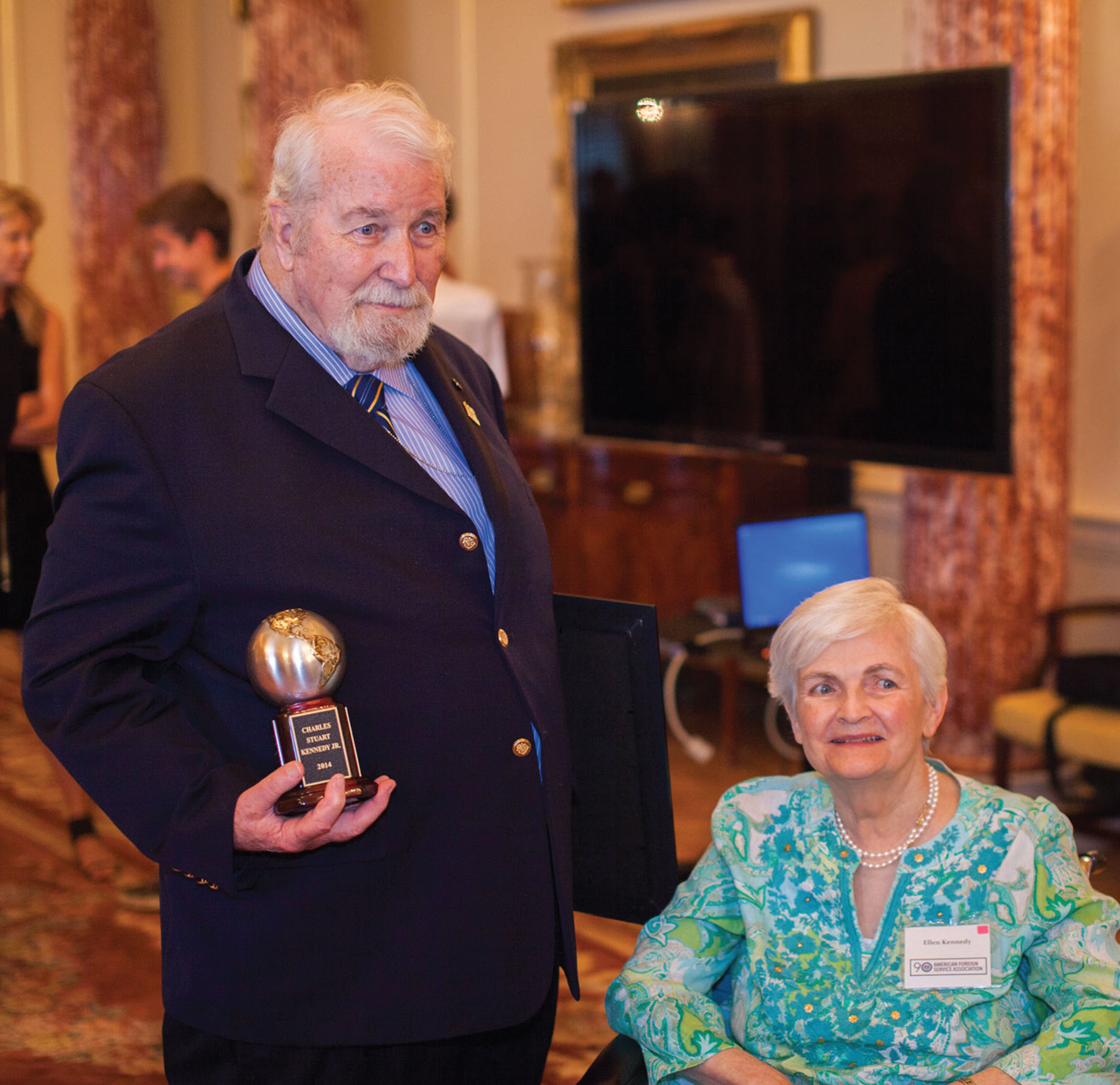
Stu Kennedy and his wife, Ellen, at the June 18 AFSA Award Ceremony.
AFSA / Joaquin Sosa
SD: Do you gain a sense, in terms of competency, of how people perform when they are in the top position? Can you tell from talking to them whether they were successful?
SK: Well, I’ve talked to, for example, Avis Bohlen, who was deputy chief of mission to Ambassador Pamela Harriman in France. She was glowing about the ability of Pamela Harriman, said she was a real pro. And there are other political appointees who did well.
I get both sides. You get some career FSOs who reach the ambassadorial level and really aren’t very good managers. I have a personal aversion to anyone who is nasty to their staff. A good political appointee coming out of the political side can often talk to the political figures in the country where they are. I mean, politics is politics. And they’re probably better at it, to some extent, than the Foreign Service officer. It depends on the personality.
I’m uncomfortable with the whole idea of making political contributions to get appointed, even though every administration does that. But to me, it’s bribery.
SD: Overall, do you think that most people coming out of the Foreign Service are pleased with the career they’ve had?
SK: Oh, sure. I’ve been interviewing people for more than 30 years. I have a fairly low threshold for boredom, and I’m not bored yet. I think it’s a marvelous career, and I can’t think of any one that could be more fun. For one thing, you keep changing jobs and posts instead of doing the same thing year after year, and the people change. And if you’re stuck with a lousy boss, or someone who’s incompetent, either you’ll move or they will.
SD: What would you tell students coming out of college or grad school about the Foreign Service as a career?
SK: You have to be a certain type. For example, it may sound silly, but I’m not that turned on by money. If money really interests you, and vacations down in the Bahamas or something like that, or if you’re not willing to take some rather lousy assignments, then the Foreign Service isn’t going to work out. But I found interesting things every place I went. I enjoyed walking the streets and seeing something different every day.
I had one person say at the end of the interview: “My God, they paid me to do this!” Some people have had bad experiences, but that’s part of our profession, too.
SD: Any final thoughts on the oral history program?
SK: I want to be careful not to make this sound like I’m the oral historian for the Foreign Service. There are others involved. When I started this, there was an oral history of Foreign Service spouses and one for USIA newly underway. They were being done by the wives of retired FSOs and retired USIA officers on their own.
After I got into this, I contacted a British diplomat, Malcolm McBain, who had been ambassador to Madagascar. I passed everything I’d learned on to him. But he did all the work and started the British Oral History Programme. We helped instigate it and kept up a correspondence with them. It’s located at Cambridge University. You can find it through Cambridge online. They have about 150 oral histories now.
SD: The oral histories are one of the best possible outreach tools—educational, and not just for students.
SK: Exactly right. We really have three audiences. One is the professional Foreign Service officers, and they’re using these excerpts as discussion matters. Two, the general public. And the third audience is the pundits and others of the “chattering class” who teach and write about diplomacy.
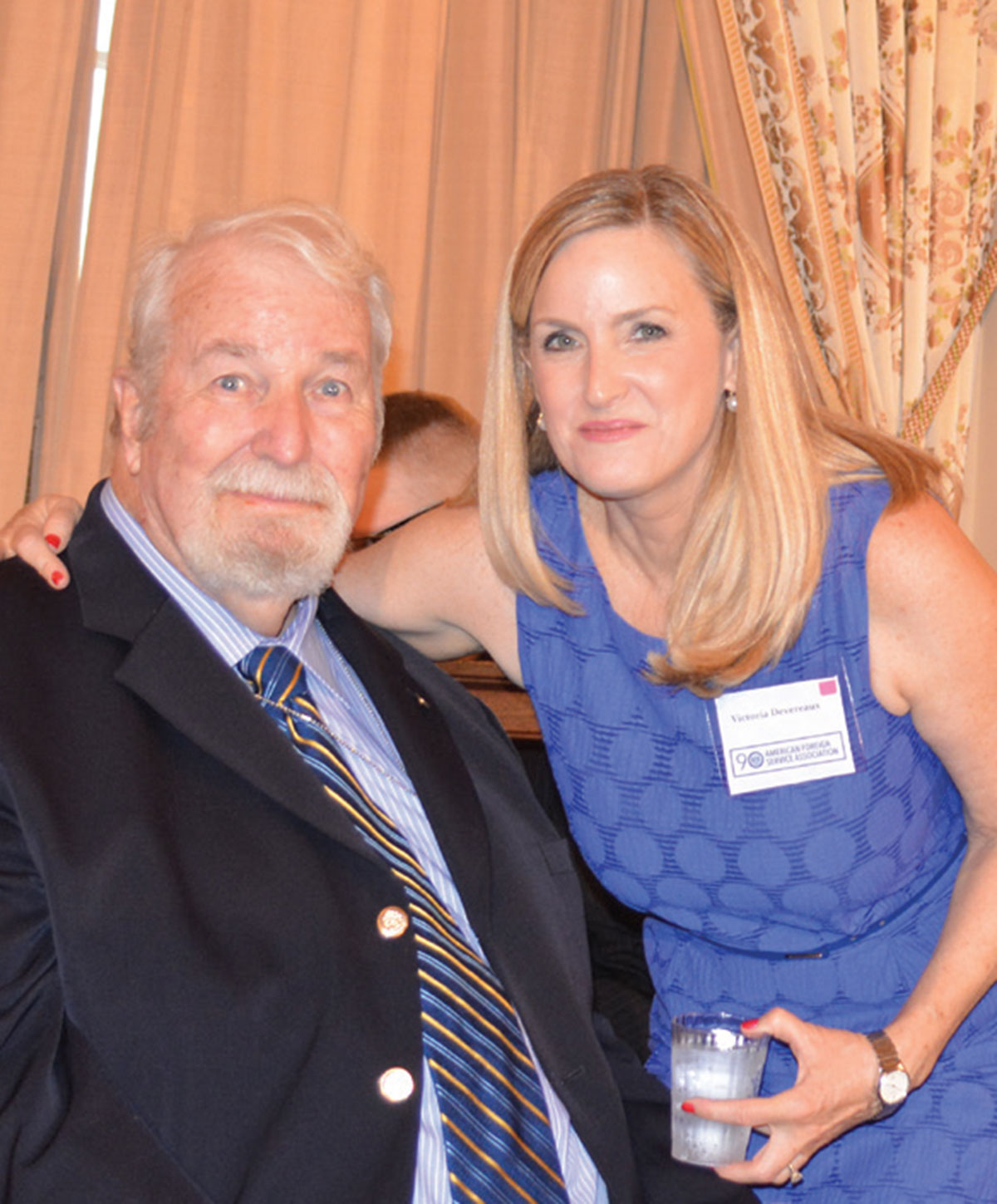
Mr. Kennedy is congratulated by his daughter, Vickie Devereaux, at the ceremony.
AFSA / Joaquin Sosa
SD: The oral history collection seems like a great bridge between the study and the practice of diplomacy. With such a bridge, do you think academics can learn from the practitioners, and also the other way around?
SK: My own prejudice is that if you’re practicing diplomacy, you’re doing something. If you’re teaching diplomacy and nobody’s reading about it, it’s just hot air. One of the things I really want to do is to develop a sense of history within the Foreign Service.
SD: Any final thoughts to share?
SK: I want to say a word about this little organization we have here, the Association for Diplomatic Studies and Training. Really, it’s quite small. And even though we can only pay McDonald’s-level wages, it’s kept going and most of the staff have stayed on. We are only about five people, and we each have our own specialty.
Our interns have been a big help in so many ways. For one, they bring enthusiasm. And we give them “substantive” work. The goal for our first group of interns was to get things organized and put together our country readers. It took a long time, but now we’re pretty well caught up.
Now we’re asking them to go through the transcripts and pick out tidbits and stories that can tie to foreign affairs today. We’ve got these on our website, www.adst.org. Thanks to Executive Director Chris Sibilla, our newest staff member, this website gets something like 35,000 hits a month. That means a great number of people in the public are able to understand what diplomats do. It shows that we don’t just sit around in striped pants writing treaties.
SD: It’s been a pleasure talking with you, and I really appreciate your taking the time.
SK: No, thank you!

